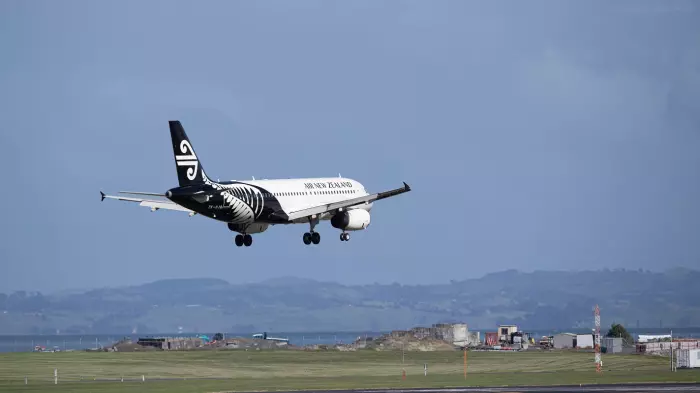Air New Zealand 2022 Interim Results
HALFYR
Thu, Feb 24 2022 08:30 am
Air New Zealand announces interim loss and updates outlook for the full year as preparations continue for ‘revive’
Interim results summary
• A statutory loss before taxation of $376 million for the six-month period ending 31 December 2021
• Operating revenue 9 percent lower than the prior period, driven by a 26 percent decline in passenger revenue due to the national alert level restrictions and 107-day Auckland lockdown
• Cargo revenue increased 29 percent on the same period last year to $482 million, supported by Government freight support schemes
• Fuel costs increased 14% to $174 million for the half year, with the increasing cost of fuel expected to impact the second half
• Drawings under Crown Standby Loan Facility (the Crown Facility) are $760 million as at 23 February 2022
• Liquidity of $1.4 billion as at 23 February 2022, made up of approximately $170 million of cash and $1.24 billion of available funds under the remaining Crown Facility and Redeemable Shares
• Steps to recapitalise the balance sheet are underway including an equity capital raise that is intended to be launched by the end of March 2022 or shortly thereafter, subject to market conditions
• Dividends remain suspended
• Current expectation for the full 2022 financial year is a loss before taxation and other significant items that will exceed $800 million
Air New Zealand reported a statutory loss before taxation of $376 million which includes a $9 million loss from other significant items (aircraft impairment and foreign exchange losses on uncovered debt) for the six-month period ended 31 December 2021. The result reflects the substantial impact the Covid-19 pandemic continues to have on the airline. This compares to a statutory loss before taxation of $105 million for the same period last year.
Continued restrictions on international travel, the national lockdown which commenced in August 2021 and the extended period of travel restrictions for the Auckland region saw the airline’s operating revenue decline 9 percent to $1.1 billion in the period. Passenger flying was down 26 percent from the corresponding period in financial year 2021 and was down 84 percent compared to pre-Covid levels.
Chief Executive Officer Greg Foran says limited international travel on top of local lockdowns in the first half of the financial year had a huge impact on this interim result.
“The airline has typically derived two-thirds of its revenue from its international passenger network and much of that was effectively grounded for the majority of the first half.”
Compared to 2020 and 2021 which saw shorter, sporadic lockdowns, the longer lockdown and Auckland border restrictions contributed to the loss in the first half and an extremely challenging time for the airline’s 8,400 employees.
“I couldn’t be prouder of our Air New Zealand whānau for what they’ve achieved this year so far. Everything from adding flights so Northland could remain connected to the rest of the country while the Auckland border was in place, to the digital solution for our customers to seamlessly upload their vaccine pass to their Air New Zealand app. The restart of the domestic network in December in time for the holidays went like clockwork, as did the reopening of the Cook Islands bubble in January.”
Despite the remaining uncertainty around future travel demand and ongoing impacts on financial performance, Mr Foran can see light ahead for the airline.
“Looking at what is happening around the world and at home, we can see the path back to the Revive phase of our Survive, Revive, Thrive plan. We have the right strategy, the right people and we are ready to fly. We’re excited about welcoming Kiwis home in the coming days and months and international travellers back to Aotearoa later in the year.”
“We’re bringing back approximately 250 cabin crew and pilots and have reanimated one of our Boeing 777-300s to do some of the cargo heavy lifting. Looking further out to the end of this calendar year, we will be ramping up more passenger flights to North America and looking forward to starting up our direct service to New York City.”
“As we continue operating through Covid, we know safety and wellbeing is even more important to our customers. There are a number of actions we have taken in this area, including vaccine requirements for international and domestic travel, and continuously updating our procedures to keep people safe onboard,” says Mr Foran.
Air New Zealand was recently named the world's safest airline by the Australian rating service AirlineRatings.com, highlighting the airline’s laser-focus on safety and Mr Foran says there’s more work going on in the airline to make sure we continue to take care further than any other airline.
“When we get back to international passenger flying we’ll be making sure our customers get the very best of our uniquely Kiwi hospitality.”
“Looking to a sustainable future, we’ve made progress towards our aim of being carbon neutral by 2050. We signed an agreement with the Ministry of Business, Innovation & Employment to conduct a feasibility study into a local supply of sustainable aviation fuel and have a Memorandum of Understanding in place with Airbus to explore the use of hydrogen aircraft in New Zealand.”
Chair Dame Therese Walsh noted that while optimism for the future is well-founded, the 2022 financial year is the most difficult one yet for the airline.
“It would be easy to think the first year of the pandemic had the biggest impact on Air New Zealand’s finances. However, only the final quarter of the 2020 financial year was impacted, and in the 2021 financial year the airline was able to access relief support from the Government through various subsidies, PAYE deferrals and cargo support schemes. The domestic network largely kept flying across the 2021 financial year and the trans-Tasman and Cook Islands bubbles gave a real boost to the second half of 2021. The 2022 financial year has and will continue to be much more heavily impacted, both by continued suppressed demand and rising costs,” says Dame Therese.
“As we’ve all seen at the petrol pumps, the cost of fuel has been significantly increasing – and although we have hedging strategies in place, we expect to see these rising costs start to come through in the second half and beyond.”
A bright spot was the cargo business, which continued to perform strongly, with the extension of the Government’s Maintaining International Air Connectivity (MIAC) scheme and the Australian Government’s International Freight Assistance Mechanism (IFAM) scheme.
“Our cargo operation has been outstanding throughout the pandemic and continues to play an essential role in connecting New Zealand to the world. Cargo revenue increased by 29 percent to $482 million for this first half compared to the same period in 2021,” notes Dame Therese.
“Despite the financial result, we remain encouraged about the future of air travel. Kiwis love to travel, and as seeing their own country is the only option for the moment, they have been making the most of it over this summer, supporting the local economy and our tourism industry. We had more than 24,000 flights moving 1.3 million customers around New Zealand in December and January.”
“I’m confident in the continued resilience and agility of the business to respond to the challenges ahead. We have an exceptional executive team led by Greg Foran, a focused strategy to keep the airline heading in the right direction, and we are making sound investments in our people, customer experience and infrastructure for the future.”
“I want to thank our customers for their continued support and patience as we’ve had to swiftly adapt our schedules and services in response to the constantly changing environment. We’re looking forward to playing our part in those long-awaited reunions as more Kiwis head back home on our international services”.
Financial information:
Outlook for 2022
There remains a large degree of uncertainty on the impact of the Omicron variant on demand for domestic travel for the remainder of the financial year.
Additionally, while recent clarity on the phasing of border openings for New Zealand is helpful, the timing of reduced or removed self-isolation restrictions remains unclear, driving continued uncertainty in the level of demand for international air travel. Self-isolation restrictions are expected to continue to have a substantial adverse impact on international demand in the second half of 2022 financial year, and for as long as those restrictions exist.
Air New Zealand’s current expectations are that the 2022 financial year will incur a loss before taxation and other significant items that exceeds $800 million.
Liquidity and cash burn update – Dividend remains suspended
In mid-December we announced a revised Crown support package, comprising of a further $500 million of additional liquidity. Total support from the Crown is now $2 billion, consisting of $1 billion of the Crown Facility and $1 billion of non-voting redeemable shares.
As at 23 February 2022, the airline has available liquidity of $1.4 billion, consisting of cash of approximately $170 million, $240 million of available funds on the Crown Facility and $1.0 billion of redeemable shares. The total amount drawn on the Crown Facility as at 31 December 2021 was $545 million and as at 23 February was $760 million.
Based on the current demand profile and noting the last of three PAYE repayments to the Crown of approximately $100 million due in March, the airline expects it will begin issuing redeemable shares in March 2022. The redeemable shares become available, and will be accessed incrementally, once $850 million has been drawn under the Crown Facility.
Due to the ongoing financial impact from Covid-19, and the restrictions of the Crown Facility, dividends remain suspended. Accordingly, there will be no interim dividend for the 2022 financial year.
Capital structure update
Air New Zealand continues to actively engage with the Crown as it assesses its longer-term capital structure and funding needs. This includes the revised Crown support package comprising a further $500 million of additional liquidity that was announced in December. This better positions the airline during the period up to its recapitalisation including an ordinary equity raising. The revised package has increased the overall liquidity support to $2 billion.
Air New Zealand intends to launch an equity capital raise before the end of March 2022 or shortly thereafter, subject to market conditions. Given the critical role the company has in New Zealand’s economy and society, the Crown is supportive of this intention and has confirmed its longstanding commitment to maintaining a majority shareholding and, subject to Cabinet being satisfied with the terms of Air New Zealand’s proposed equity capital raise, it would participate in the equity capital raise in order to maintain a majority shareholding in Air New Zealand.
The airline would like to thank its shareholders again for their continued support and patience.
Ends




